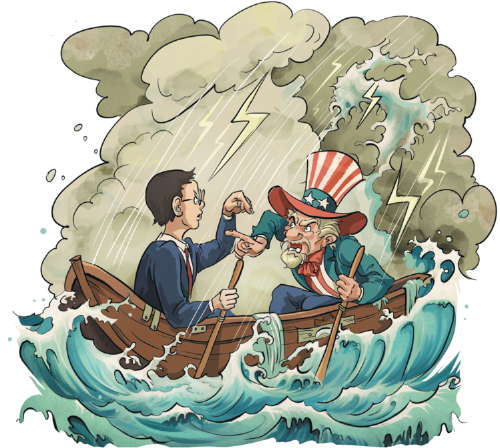
MA XUEJING/CHINA DAILY
Editor's note:As the world's two largest economies and countries facing multiple challenges, China and the US need to strengthen cooperation, fulfill their international responsibilities, and work together to advance the world peace and development in line with the principles of mutual respect, peaceful coexistence and win-win cooperation. Three experts share their views on the issue with China Daily.
The US-China relationship, the most consequential bilateral relationship in the world, stands at a delicate juncture. After two years of false starts under the Joe Biden administration, including due to a wayward balloon that blew ties off course, the two countries are finally in sight of an opportunity to begin stabilizing their rocky relationship.
Washington and Beijing must not pass up this opportunity. They must begin erecting the "guardrails" that President Joe Biden and President Xi Jinping had envisaged at their meeting in Bali, Indonesia, on the sidelines of the G20 Summit in November 2022. For these guardrails to be durable and long-lasting though, they must abide by certain broad common understandings.
First, US-China relations must be built on the basis of equality and mutual respect. Beneficial engagement cannot, as a matter of principle, coexist with sanctions, coercion and suppression. The broad thrust of policy must be to reassure the other and seek to minimize differences. The practice of individual self-restraint rather than the pursuit of behavior modification of the opponent must become the order of the day.
And while both sides remain at liberty to introduce sanctions on designated individuals and entities deemed to be a threat to national security or public interest, neither side should harbor the illusion that business-as-usual lines of communication can be maintained with parties they have unilaterally sanctioned. Sanctioning incumbent Cabinet-level officials is particularly disrespectful and should be eschewed. If the Biden administration wishes to restart the defense ministers' dialogue, it must first drop Chinese State Councilor and Minister of National Defense Li Shangfu from its "specially designated nationals and blocked persons" list.
Second, US-China relations must be framed with a forward-looking and constructive perspective, without losing sight of the grave underlying challenges. In Bali, Xi had proffered "three noes" — China does not seek to change the existing international order; does not interfere in the US' internal affairs; and has no intention of challenging or displacing the United States.
For his part, Biden tendered "five noes" — the US does not seek a new Cold War; does not seek to change China's system; the revitalization of its alliances is not directed at China; does not support the independence of the Chinese island of Taiwan; and does not seek conflict with China.
These assurances provide a thick layer of geopolitical ballast to steady the ship of US-China relations. It serves little useful purpose for either side to dwell incessantly on the underlying intentions, and integrity, of its counterpart's assurances. Rather, both sides should accept them in good faith, abide by them, and aspire to memorialize them in a joint communique in the years ahead if the opportunity arises.
Third, there must be an observable symmetry between words and deeds in the conduct of US-China relations. Contrary to its assertions, the Biden administration's numerous technology denial measures against China are not grounded only in national security and supply chain resilience considerations. They are also intended to furnish an unfair economic competitive edge as well as selectively decouple the two economies in areas of commercial exchange that reach well beyond the perimeter of national security.
The inclination to say one thing and do another that is diametrically opposite must be discouraged. And both sides should desist from taking punitive measures that violate prior understandings, particularly during or immediately after a meeting of leaders or senior officials.
Finally, Sino-US relations must be based on respect for each other's core interests, starting with the respect for territorial integrity. Washington says it "acknowledges" but does not necessarily "recognize" or "admit" that Taiwan is a part of China.
Washington also says this has been the US' position since the days of the Shanghai Communique. At the same time, Washington vowed in the communique that it would "not challenge (Chinese) position" that Taiwan is an integral part of China. Yet of late the US has been relentlessly challenging China's one-China principle. This challenge must stop, and the US must credibly signal that its "one-China policy" is not being hollowed out beyond recognition.
Beijing, on its part, must credibly signal that peaceful reunification remains on the table. Also, violations of sovereignty, like the balloon incident, must be avoided at all costs.
Looking ahead, the scope for progress in US-China relations in the near term is modest, at best. With the presidential election season looming in the US, Biden will be looking over his right shoulder to ensure that he is not politically outflanked as being "soft on China". The domestic purpose of the proposed guardrails is to devolve a modicum of predictability and balance to bilateral ties — lest instability or uncontrollable tensions in US-China relations hand his harder-line Republican opponents a handy beating stick.
Be that as it may, the US-China guardrails could yet serve as a building block for a more stable and constructive relationship, post-2024. Democratic Party presidents in the post-Cold War era, from Bill Clinton to Barack Obama, have managed to author successful relationships with their counterparts in Beijing during their second terms.
And as improbable as this might seem in the post-Donald Trump "new normal" in Sino-US ties, a new window of opportunity could yet open up if Biden — a statesman steeped in the politics of US-China normalization — is reelected to office. Much hinges therefore on getting the guardrails done right at the present time.

The author is a senior fellow at the Institute for China-America Studies in Washington, D.C.
The views don't necessarily reflect those of China Daily.
The looming danger of crossing Beijing's Taiwan question redline
Tang Yonghong
The Russia-Ukraine conflict, which began more than 15 months ago, has caused immense suffering to the people of Ukraine while hurting the Russian economy. The US, after pushing Ukraine into the conflict, eventually refrained from direct military confrontation with Russia. The US' questionable role in the conflict and its evil design to compare the Ukraine crisis with the Taiwan question have raised "doubts" among Taiwan residents that the island may face a fate similar to Ukraine.
However, the nature of cross-Taiwan Strait relations and the Taiwan question are fundamentally different from Russia-Ukraine relations and the Ukraine crisis. To begin with, Russia and Ukraine are two sovereign nations, while cross-Strait relations are those between different regions of the same sovereign country, China.
The Ukraine crisis is about one country's actions endangering the security of another country, whereas the Taiwan question involves the collusion of external forces with the aim of splitting Taiwan from the motherland, thereby undermining the country's sovereignty and territorial integrity and national security.
Beijing has consistently opposed "Taiwan independence" and external forces' interference in the country's internal affairs, which is exactly what the Taiwan question is. There are certain principles that should be abided by all countries that have diplomatic relations with Beijing. They should acknowledge the one-China principle that there is only one China and Taiwan is an integral part of China, and never allow separatists on the island to seek "independence".
More important, Beijing will not sit idly by while separatist forces in Taiwan collude with foreign anti-Beijing forces in a bid to separate the island from the motherland.
In fact, Beijing has already enacted the Anti-Secession Law. According to the law, if the "Taiwan independence" secessionist forces act under any name or by any means to cause the fact of Taiwan's secession from China, or if major incidents entailing Taiwan's secession from China should occur, or the possibilities for a peaceful reunification should be completely exhausted, the state shall employ non-peaceful means and other necessary measures to protect China's sovereignty and territorial integrity.
Besides, the Chinese mainland has the capability and determination to prevent the island's separatist forces from seeking "independence". Beijing may not yet be on par with Washington in overall military strength, but the latter no longer holds the advantage in scenarios such as a cross-Strait conflict.
In fact, if the mainland were to resort to the use of force to suppress separatist forces on the island and achieve national reunification, even a US-led international intervention cannot prevent it. This is the fundamental reason why the US maintains strategic ambiguity on the Taiwan question and refuses to make clear its stance on the "defending-Taiwan-with-force" issue.
Given the significant tangible benefits it derives from Sino-US relations, Washington needs to weigh the potential consequences of openly expressing support for the "Taiwan independence" forces, because it could potentially force Beijing to sever diplomatic ties with it. Also, the fact that the mainland is capable of causing serious harm to the US has prompted American leaders to consider the immense cost that a cross-Strait or Sino-US conflict would entail.
No wonder the US, on the one hand, uses various strategies, including playing the "Taiwan card", to provoke Beijing, while, on the other hand, it seeks dialogue with senior Chinese officials and promises the "five noes" (that is, it does not seek a new Cold War, does not seek to change China's system, doe not seek to confront China through strengthened alliances, does not support "Taiwan independence", and does not seek conflict with China).
The US, it appears, is not willing to sever diplomatic ties with China, in order to support the island's separatists to seek "independence" nor is it willing to engage in a mutually destructive military conflict with China.
If that is so, the US should stop saying one thing and doing the exact opposite. It should also stop sending wrong signals to the separatist forces in Taiwan. The "Taiwan independence" forces are well aware that any attempt to seek their separatist goal will inevitably lead to a cross-Strait conflict, which the majority of Taiwan residents do not want. That's why the island's separatist forces rely on US-led Western support to achieve their evil goal.
The US is playing the "Taiwan card" to encircle the mainland, giving the "Taiwan independence" forces that have longed for US support some hope. In order to obtain US support, the "Taiwan independence" forces and the ruling Democratic Progressive Party authorities are not only willing to become pawns in the US' geopolitical game, but also support the establishment of US-led alliances in the region as part of their efforts to cause a breakdown in Sino-US relations, thus forcing the US to intervene militarily to "defend" Taiwan.
This does not align with the interests of the US. Nor will China allow this to happen.

The author is a professor at the Taiwan Research Center, Xiamen University.
The views don't necessarily represent those of China Daily.
Washington can't rupture peace in Asia-Pacific
Khalid TaimurAkram
The United States' efforts to promote so-called democracy across the world by creating divisions among countries are heightening tensions in the Asia-Pacific region. And its ambiguous stance on the Taiwan question — despite saying it acknowledges the "one-China policy", it continues to sell weapons to the Chinese island — is a ploy to maintain its hegemony.
As a matter of fact, Michael McCaul, Republican chairman of the House Foreign Affairs Committee, recently said the US will provide weapons for Taiwan, and will ensure their delivery. He also said Congress is working to expedite the latest sales.
This is not only an attempt to further raise the already high tensions in the region but also a direct interference in China's internal affairs.
Tensions between China and the US have escalated due to the increasing frequency and intensity of US' illegal military activities in the South China Sea, which are a threat to China's national security and contrary to the spirit of the UN Charter, which is aimed at maintaining global peace and improving state-to-state relations.
The US has also been conducting reconnaissance operations and military exercises off the coast of China in recent years in violation of international law and the basic norms of international relations.
Despite the Russia-Ukraine conflict, the US has continued to hold military drills in the South China Sea in an attempt to not only to warn Russia but also provoke China, significantly increasing the risk of a conflict. The US has also been flexing its military muscles by ordering its naval ships to sail through the Taiwan Strait in the name of "freedom of navigation". Indeed, the US military's presence and operations in the South China Sea and the Taiwan Strait are significant factors affecting the situation in the Asia-Pacific.
The US' foreign policy has become increasingly problematic over time, with recent unscripted remarks by US President Joe Biden complicating the matters further. Biden, as a matter of fact, has come to be known as a president who says one thing and does another. Perhaps his biggest political faux pas was not stopping Nancy Pelosi, then House of Representatives speaker, from visiting Taiwan in August 2022, which further deteriorated Sino-US relations.
But despite Washington's continued illegal efforts to spread propaganda against China and rally other countries to join the anti-China camp, many countries have refused to take sides in the disputes between Washington and Beijing. Instead, many of these countries are deepening their economic relations with China while taking measures to diversify their business operations and build new supply chains. This is evidenced by China overtaking the US to become the European Union's largest trading partner in 2020.
Since many Asian and European leaders seek to strengthen their countries' economic relations with China, Washington's strategy to decouple from China and isolate it in the global economy is not bearing fruit. In particular, many countries in the Global South, including African countries, refuse to become a pawn in the US' geopolitical game. While Saudi Arabia, China's largest trading partner in the Middle East, relies heavily on collaboration with Chinese tech companies such as Alibaba and Huawei to realize its Vision 2030 development plan, Indonesia, a country the US has tried to use to curb China's growing influence in the Asia-Pacific region, has chosen Huawei to help address its cybersecurity problems.
Washington's geopolitical strategy, since it is self-centered and divisive, has been rejected by many countries. It is not aligned with the interests of other countries that are expanding their economic relations with China while diversifying their business operations. And therefore it has lost its credibility as a sound economy and influential superpower.
It's time the US learned to accept the reality of China's peaceful rise and its growing image as a promoter of peace and development. The US could also learn from the June 2-4 Shangri-La Dialogue, where the defense ministers of Asia-Pacific countries discussed how to maintain peace in order to create a favorable atmosphere for common development for mutual benefit.

The author is executive director, Pakistan Research Center for a Community with Shared Future, Islamabad.
The views don't necessarily reflect those of China Daily.












